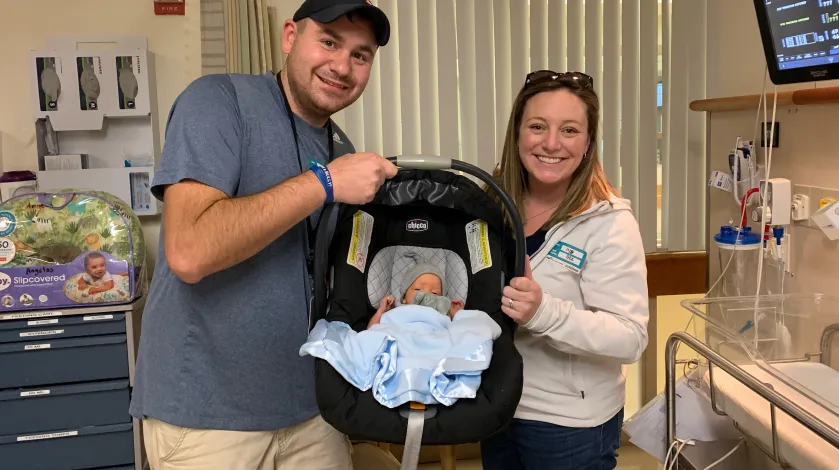The Angelos Family’s Story: Family Integrated Care Improves the NICU Experience
Author

South Shore Health
No parent expects to spend the first weeks of their child’s life in a neonatal intensive care unit. And, when they get the news that they’re expecting again, a return to the NICU isn’t what they envision either.
Whitman couple Jeannie and Jeremy Angelos spent the early days of both their sons’ lives at the Messina Family Neonatal Intensive Care Unit (NICU) at South Shore Hospital.
But while their sons were hospitalized in the same NICU bed, with many of the same caregivers, the two experiences were vastly different, thanks to a new approach to caring for premature infants that puts the family at the center of the baby’s care team.
Two difficult birth experiences
In 2017, Jeannie and Jeremy were 30 weeks into pregnancy with their first son when Jeannie noticed some swelling. During her prenatal appointments, her care team also noticed that her blood pressure was creeping up.
With a family history of high blood pressure, she knew she may be at risk for pre-eclampsia, a pregnancy-related complication that can be life-threatening for both mother and baby.
The Angelos’ care team decided Jeannie needed an emergency C-section. Their son was born at 33 weeks and 3 days gestation, and ultimately spent 25 days in South Shore Hospital’s NICU.
Three years later, the Angelos family prepared to welcome another child. After the complications with her first pregnancy, Jeannie was being monitored carefully throughout her second.
Her pregnancy seemed to be going well. Jeannie and Jeremy even had a bet—if they made it to 34 weeks, Jeremy would buy Jeannie a cupcake to celebrate. But it wasn’t to be.
During a routine appointment during her 32nd week, Jeannie’s providers struggled to find her son’s heartbeat. They weren’t sure what was causing the issue, but they asked the Angelos if they wanted to have another emergency C-section.
The Angelos didn’t hesitate. It was time to welcome their second son.
“It was a relief, in a sense,” Jeannie says. “We knew that unless he had a devastating defect, he’d be fine in the NICU.”
Three years after the birth of their first son, the Angelos’ younger son was born at 32 weeks, 5 days.
“We didn’t want to do this again,” Jeannie said. “But we knew we were in the right place with the right people.”
Embracing Family Integrated Care
The Angelos’ younger son was in the same exact bed that his big brother started his life in. Many members of the staff were familiar faces. But a lot had changed in the South Shore Hospital NICU.
In 2019, the Messina Family NICU became the first in Massachusetts to implement a model of care called Family Integrated Care, or FICare. This approach makes parents equal members of their child’s neonatal care team.
The Angelos noticed a difference right away. During their first son’s hospitalization, they were taught to check his temperature and change his diaper—which is a complex process due to the tubes and monitor wires that are attached to NICU patients.
This time, caregivers encouraged the Angelos to learn how to check their younger son’s feeding tube, his vital signs, and his girth—and handle those tasks while they were at their son’s bedside. Even for parents who had been through the NICU experience once before, it felt like a lot to handle. But the Angelos felt supported throughout.
“The nurses in the NICU and Special Care don’t make you feel inept or inadequate,” Jeremy adds. “They’re there to support and to help you.”
“It is never forced on you,” Jeannie says.
The FICare app was a lifeline for Jeannie and Jeremy. The app serves as a comprehensive guide for the entire family, both in the hospital and after discharge.
“When you’re at bedside, your head is spinning. Having the documents and videos on the app gives you one place to go for information,” Jeannie explains.
FICare Beyond the Bedside
The family-focused model of care reaches families, even outside the walls of the hospital.
Every morning, the Angelos participated in rounding with their son’s care team. The entire multidisciplinary team caring for their baby had a virtual check-in with them to discuss what was happening for their son that day.
It meant Jeannie had even more confidence in her son’s care team. “I knew every little thing that was going on. I never walked in to the NICU to find that something had changed that I didn’t know about.”
As parents of a three-year-old, it was tough for the Angelos to always be by their newborn’s side. The AngelEye Camera allows families like the Angelos a secure, private video feed to check in on their son in real-time. It helped Jeannie to feel connected to her son when she pumped breast milk at home.
Building a Community for NICU Parents
The FICare approach was launched by South Shore Health caregivers and parents of NICU patients working As One to provide the best possible experience for other families.
Parents of hospitalized newborns can join a free, virtual, weekly support group with parents of babies who’ve “graduated” from the NICU. These virtual sessions are a place for parents to share their victories and ask for advice when times are difficult.
“It’s really great to hear from people who’ve come out on the other side. When you’re in it, it feels like forever,” Jeannie says. “I hope that when the pandemic is over, we can meet in-person.”
Another way the South Shore Health team puts parents first is with the bead program.
Each time a baby reaches a new milestone, the care team celebrates by giving the family a special bead. At the end of their baby’s stay, parents have a bracelet that serves as a reminder of just how far their baby has come.
“It’s hard to explain unless you’ve lived through those tiny milestones. To me, these are huge accomplishments,” Jeannie explains. “The nurses are so busy, but they never let you forget your beads. They are just as enthusiastic about the program.”
At the end of a long road, two healthy Angelos babies
After more than five weeks in the Messina Family NICU, the Angelos’ second son headed home.
“One day, the team unplugs all the monitors and sends your baby home. But you’re still taking home a tiny four or five pound baby, and it’s intimidating. The FICare approach made us feel more confident in taking our baby home.”
Once their youngest son got home, they displayed his bead bracelet in his nursery, and they plan to keep it with all his baby memories.
Having two difficult birth experiences wasn’t easy. But the Angelos are grateful to have a NICU so close to home.
“We’re lucky to have this so close to us. We owe our whole family to these people. They’re not just focused on patient care. They go above and beyond to include the family, and acknowledge that having an involved family is so important for child’s development. Kids do well when their parents are in a good place.”
Today, Jeannie gives back by joining the NICU support group calls to help new parents through their baby’s hospitalization. Their sons sometimes pops up in the Zoom screen, an important reminder to new parents that, though the road is long, their babies are on the road to a healthier future.
Learn more about Family Integrated Care
Author

South Shore Health










